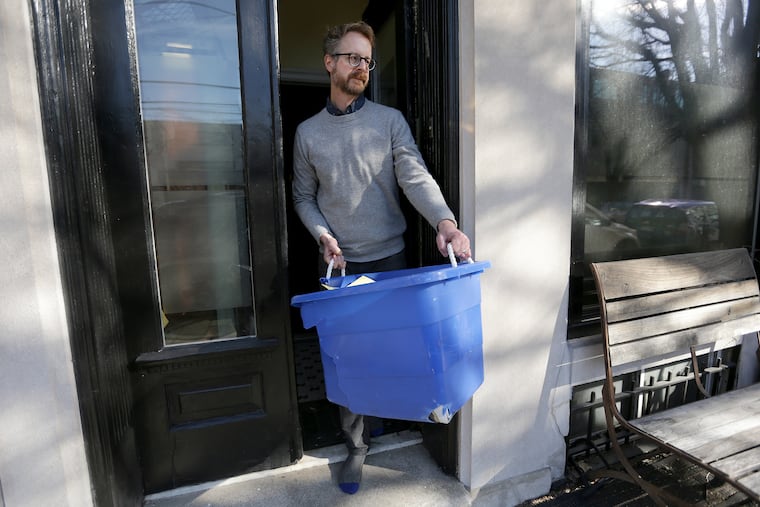The frustrating charade of recycling in Philadelphia | Opinion
Why bother recycling when about half of Philadelphia’s recyclables, mine presumably among them, were going straight to the incinerator?

Peanut butter jars may be the hardest to get clean, but still I soak them in hot water to break down the oil. Like all jar and bottle tops, the hard plastic lids can’t be recycled in Philadelphia, and so I discard them. I rinse out the tiny plastic salsa containers that come with takeout orders of tacos and, not sure if I get them clean enough, toss them hopefully into the recycling bin.
I remove the clear plastic windows from envelopes. With dedication I peel packing tape from cardboard boxes one layer at a time, break down the boxes, and fold them as small as they will go. From the plastic containers industrial farms use to package berries, I remove the gummy glue that holds the paper insert in place. I wash the red stains from the container and put it and the paper insert into the blue bin.
I dump the crumbs out of a pizza box, discard the wax paper, and, seeing that beneath the paper the cardboard is stained with grease, detach the pizza box top — perforated for this purpose — from the bottom, which goes into the trash. The uncontaminated top can be recycled. With meditative concentration, I fold it and slip it inside the pile of newspapers, cereal boxes, and magazines that will go on to a second life.
Only they won’t.
The entire performance, Sisyphean at heart, is also an unnerving charade. The Inquirer reported in late January that about half of Philadelphia’s recyclables, mine presumably among them, were going straight to the incinerator at a trash-to-steam plant in Chester due to the closing of the Chinese market for European and American recyclables. Since then, like many people, I’ve nonetheless continued to clean and sort my family’s waste with abiding care. In an age of multiple ecological crises, recycling is how many of us express a sense of responsibility for the earth, even as we junk record levels of single-use plastics at every turn. Even, as now, we know full well we’re pretending.
By a certain accounting, we’ve been pretending to be stewards of our waste all along.
Until a year ago, when the Chinese government closed the country’s ports to American and European recyclables, Philadelphia shipped about 22 percent of its solid waste to China to be recycled. According to the National League of Cities, in 2016 China accepted 16 million tons of American recycling, valued at $5.2 billion, at a rate of 4,000 shipping containers each day. The Chinese were purchasing contaminated materials and trash along with clean recyclables; they incinerated and landfilled what could not be reused, meaning that we Americans were unloading our waste problem on the Chinese. (The U.S. produces more solid waste than any other nation in the world and the trash stream is growing.
They were paying us to pretend we were doing our share, a sleight of hand when scientists produce daily reports on the degradation caused by the developed world’s endless unblinking consumption. This numbing dissonance is a nagging feature of contemporary life. We humans are sleepwalking to tragedy. Yet the scale of the environmental challenges facing us, and their fundamental interconnectivity, defy even the most determined and conscious among us. Each one of us is responsible for the spiraling consequences of actions produced collectively across vast time and space — an impossible fate for a moral being.
And a steep challenge for a cash-strapped, impoverished city like Philadelphia. Like the opioid crisis, the blossoming particularly of single-use plastic — such as those tiny salsa containers — is a societal epidemic that manifests in the streets of cities, which have to bear the frontline costs.
When the Chinese decided they would no longer landfill or incinerate our contaminated recycling, which was contributing to toxic pollution and carbon dioxide emissions, it forced American cities to renegotiate contracts for waste disposal. The change caught Philadelphia at the end of its recycling contract with Republic Services. All of a sudden, instead of being paid for recycling, as it was a few years ago, Philadelphia was going to have to pay for it, more than twice per ton as the city pays for trash incineration. Thus officials decided to sign a short-term deal with another contractor that agreed to take half the city’s recyclables, leaving the rest to go with the trash to the incinerator.
The charade, then, is indeed temporary. Soon Philadelphia officials will announce new waste contracts that promise new markets for recyclable materials (for some of them demand remains high). This will relieve me — and half the city — of the curse of pretending. Cleaning and sorting recycling feels good because it’s something we can do that aligns with our sense of responsibility, but we’re still sleepwalking if we don’t demand that collectively — through actions of state and federal government and corporations — we sharply cut the flow of stuff.
It is, quite literally, too much to handle.
Nathaniel Popkin is a Philadelphia author. Monday, March 4, he’ll discuss the ecological crisis with environmental experts at “Tomorrow Is Now: How Will We Survive a Changing Climate” at the Academy of Natural Sciences of Drexel University (free and open to the public) and on March 28 at the Rosenbach Museum along with Bethany Wiggin of the Penn Center for Environmental Humanities (free with museum entrance).